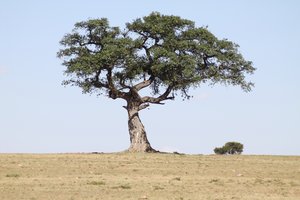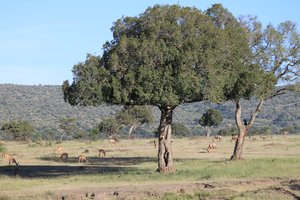Risk assessments of climate change impact on key-stone trees in the Maasai Mara ecosystem
Trees are key-stone elements of many terrestrial ecosystems. They contribute to important local and regional biochemical cycles. e.g., by capturing CO2 from the atmosphere. Due to this capacity, trees play a crucial role in ameliorating climate change by CO2 sequestration where CO2 from the atmosphere is stored as carbon in stems and roots, thereby reducing the greenhouse effect. Trees also influence hydrology by absorbing, intercepting and storing precipitation, and releasing water to the atmosphere through transpiration, maintaining ground water levels and reducing runoff. Trees are a source of food, shelter, and habitat for many organisms. On the African savanna, trees have a key function by provisioning food to browsing herbivore species. Savanna trees are also important to local people in the region by providing fuel-wood, building material, food and parts used for medicinal purposes.
Africa has been forecasted to be particularly vulnerable to future climate change as the continent is also exposed to many additional challenges such as ecosystem degradation due to disasters and land-use changes. Moreover, Africa is experiencing a rapid human population increase, which combined with poverty and political unrest makes the continent less adaptable to future climate changes. It has been found that the biggest future threat to biodiversity in the region is land-use change followed by climate change. The Maasai Mara ecosystem is already experiencing vegetation degradation due to overgrazing, unsustainable agricultural practices, increasing demand for fuel-wood as well as charcoal production. Future climate change could exacerbate these risks to the ecosystem, with one major risk being declines in climatic suitability for important tree species in the region. This would not only affect ecosystem functioning, but also affect those people who are dependent on the trees as resources. It is therefore important to improve our understanding of the potential future ecological dynamics in the Maasai Mara region.
This project will assess to what extent selected key-stone tree species occurring in the Maasai Mara ecosystem will be vulnerable to future climate change. This study could form the basis for further risk analyses of the Maasai Mara flora and the development of climate change adaptation and mitigation initiatives.
Partners:
Professor Jens-Christian Svenning, Aarhus University, Denmark
Professor Aggrey M. Thuo, Maasai Mara University, Kenya
Center Manager, PhD, Anne Blach Overgaard, Aarhus University, Denmark
PhD student Jedidah Nankaya, Maasai Mara University/University of Nairobi, Kenya

